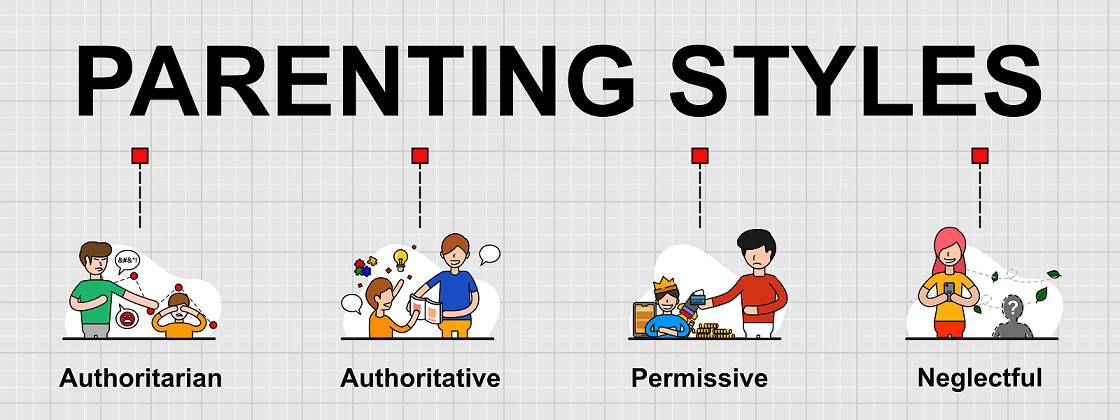It’s not an exaggeration to say that proper parenting is the backbone of the nation. The youth are our future, and how they’re raised is a huge determinant of where their ambitions will lead.
You want to raise children that are strong, secure, and most importantly happy, that’s why it’s important to know which parenting style is most encouraged in modern America.
The most encouraged parenting style in modern America is Authoritative parenting. This style makes the best compromise between discipline and validation, but it can be challenging to maintain. It won’t look the same way across different cultures – you need to focus on your actions and pending goals to see if you’re still on the right track.
There are a few different parenting styles to choose from, but the divides between them could be a little bigger than you might expect. We’ll go into more depth on that in the next paragraph.
Which Parenting Style is Most Encouraged in Modern America?

While there are many different parenting styles available, a lot of them tend to be offshoots or variations of existing ones. We’ll be focusing on the broader core parenting styles to give you a more generalizable approach to decide on – tailor it to your family dynamic as needed.
Authoritarian

Authoritarian style parenting places a heavy emphasis on obedience. It treats parents as the enforcers of a system, to which the child is expected to conform and orient their lives around.
It tends to lack warmth or positive feedback, and the little remaining tends to be transactional (i.e. praise only for achievements), which can leave children raised this way feeling insecure. This also means children raised this way often lack a strong emotional affinity towards their parents.
Authoritarian parenting also limits a child’s social development. Not only are they limited on available sources of socialization, but they’re also actively trained to adjust to people and systems rather than practicing their own personal convictions.
Authoritative

Authoritative style parenting might sound similar to the above at a glance, but it functions from input and communication as much as education – almost like a mentorship, in a way.
This method intends to impart children with positive traits while also encouraging their competitiveness, personal drive, socialization, and self-esteem. It accomplishes this by acknowledging the child’s inputs, but ultimately retaining the final say in handling situations.
Authoritative parenting wants children to function independently, encouraging exploratory behavior and critical thinking. They’re trained to engage with the world, and when done properly children raised this way tend to come out socially capable, insightful, and ambitious.
That said, it’s hard to maintain this style. Parents need to acknowledge their own shortcomings to their children, which can be a struggle for some people.
It’s easy to dip between Authoritarian and Permissive parenting, so reorienting yourself constantly is the key to successfully maintaining that balance here.
Permissive

Permissive style parenting creates an indulgent environment for children, allowing them to act however they please. There might be rules and restrictions, but these are unlikely to be properly enforced – allowing children to push these boundaries whenever they feel like it.
It provides a great deal of both freedom and warmth but fails to establish personal accountability for children raised this way. Praise and comfort are provided generously, but achievements and ambition hold very little significance for people used to always getting what they want.
This has the side effect of greatly reducing their social competency, as children here aren’t taught to engage – they’re permitted to act selfishly with minimal regulation.
Neglectful

Children in this situation are unfortunately raised with the bare minimum for subsistence, leaving everything else outside of physiological needs sparse and irregularly provisioned.
Warmth and discipline are far from guarantees, and children essentially raise themselves developmentally. This method tends to create dysfunctional individuals and extreme emotional disconnects between parents and children.
Sample Demonstration
Gillian, Annelle, Robyn, and Pam all studied for the same calculus test. Despite their best efforts, all four of them failed to meet the grade they sought out. How will each parenting style likely respond to each of these individuals’ current situations?
Gillian (Authoritarian)
Gillian’s authoritarian parents would most likely view her score as a personal shortcoming. They’d treat her coldly for her failure, and might even start taking away privileges from Gillian until her grades improved. Gillian is expected to prove her worth as a daughter with success.
Gillian’s parents likely don’t see it this way – in fact, most authoritarian-style parents wouldn’t even know they were raising their children in a borderline-transactional relationship.
This system of parenting is quite easy to inherit, and unfortunately, the normalization of this can leave parents unaware of just how harshly they’re treating their own children.
Annelle (Authoritative)
Annelle’s authoritative parents may be a bit disappointed with the result but would focus on discussing why this happened with her. They’d seek out solutions to help with the problem with Annelle’s input in mind until this academic issue gets settled properly.
On the other hand, if Annelle got this score because she didn’t try hard enough, her parents would discipline her by emphasizing the importance of academic success for her future.
If she still chose not to give her studies importance, they might start revoking privileges until she puts in the effort. While the consequences might seem similar to the prior parenting style, what sets it apart is that it didn’t lead with punishment – patience was extended first.
Authoritative parents want to persuade their children to succeed, but they can still fall back on firm boundaries and discipline if gentler approaches fail to get their point across.
Robyn (Permissive)
Robyn’s permissive parents wouldn’t really do much beyond acknowledging the failure. They would accept the grade their child got. While they might muster some token protests, most of them will be easy to placate with excuses and promises Robyn could give them.
Regardless if Robyn decides to study harder or let their grade be, their parents will play a minimal part in their journey. Even then, the latter outcome is most likely since Robyn wasn’t taught to value their academic performance the same way Gillian and Annelle were.
Pam (Neglectful)
Pam’s neglectful parents would pretty much contribute nothing – in fact, they probably wouldn’t even ask about their child’s score.
As far as they’re concerned, their role as parents stops after putting a roof over her head and food on the table. Whatever Pam does from here is entirely her choice.
Most Encouraged Parenting Style in Modern America

The most recommended style in modern America is, without a doubt, authoritative parenting. It strikes a good balance between discipline and validation, raising children with confidence, competence, emotional stability, and social skills.
We’ll assign each parenting style a keyword to give you an idea of what they stand for most.
Authoritarian – obedience
Authoritative – communication
Permissive – freedom
Neglectful – separation
The reason why Authoritative parenting works so well is that it hits a comfortable middle ground, providing firm discipline intermingled with empathy, understanding, and open communication.
Discipline isn’t just a tool for control (Authoritarian) or something to be avoided (Permissive), but something harnessed to improve your children’s competencies and drive.
Coping with the Cons of this Method

While Authoritative parenting is the most encouraged parenting style in America, there’s a reason why it’s very hard to nail down.
It’s a constant balancing act between explorative freedom and decisive behavioral regulation, and that middle ground also looks very different across cultures.
For example, authoritative parenting would permit open disagreement in western nations, but for eastern regions, this could be viewed as disrespectful. It’s hard to figure out how to do this when even the examples themselves don’t seem consistent across cultures.
How you’d choose to enforce Authoritative parenting is up to your prerogative, environment, and goals. The bottom line here is that you should never forget to communicate, no matter what.
If your child makes a mistake, you communicate what they did wrong, why it was wrong, and what they could do better. If your child refuses to learn, you should communicate why that isn’t acceptable, along with what consequences will come to follow in future instances.
If your child achieves something or wants acknowledgment, you provide them with praise and security, along with the joy and warmth you feel towards them. Communicate that you cherish them and that they’ll never be alone.
Most importantly, while communicating with your child, allow them to communicate back. Knowing that their inputs are valued will make them more motivated to work with you rather than against you – never forget that this is a team effort here.
You may not always hit the right balance of authoritativeness every time, but sticking to these rules will keep you from straying far from the core tenant of this constructive parenting style.
Final Thoughts
Authoritative style parenting is the most encouraged approach in modern America, but it’s by far the hardest to maintain. Your priority should be maintaining mutual communication, even when patience starts to wear thin for both parties.
There will never be a picture-perfect template for any parenting style, so focus on doing the best you can. Strive for improvement, and you’ll only get better at this as time goes on.

